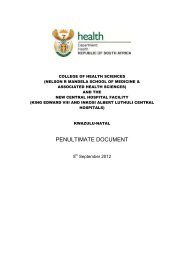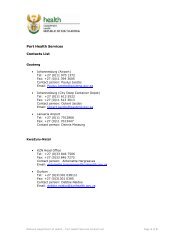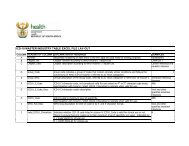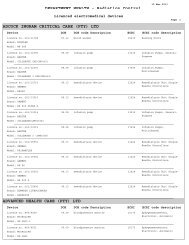eHealth Strategy South Africa 2012 - Department of Health
eHealth Strategy South Africa 2012 - Department of Health
eHealth Strategy South Africa 2012 - Department of Health
You also want an ePaper? Increase the reach of your titles
YUMPU automatically turns print PDFs into web optimized ePapers that Google loves.
Foreword by the Minister<br />
Effective monitoring <strong>of</strong> healthcare service delivery and overall<br />
performance <strong>of</strong> the health systems requires functional health<br />
information systems capable <strong>of</strong> producing real time information<br />
for decision making. Globally, Information and Communication<br />
Technology (ICT) has emerged as a critical enabling mechanism to<br />
achieve this. This <strong>e<strong>Health</strong></strong> <strong>Strategy</strong> for the public health sector in<br />
<strong>South</strong> <strong>Africa</strong> ushers in a new era <strong>of</strong> optimism about the capabilities<br />
<strong>of</strong> our health information systems.<br />
Historically, health information systems in <strong>South</strong> <strong>Africa</strong> have been<br />
characterised by fragmentation and lack <strong>of</strong> coordination, prevalence<br />
<strong>of</strong> manual systems and lack <strong>of</strong> automation, and where automation<br />
existed, there was a lack <strong>of</strong> interoperability between different<br />
systems. Considerable resources were also invested in these<br />
systems that, in the final analysis, did not generate the expected<br />
returns on investment.<br />
In August 2009, the National <strong>Health</strong> Council (NHC), chaired<br />
by myself and comprising <strong>of</strong> the 9 Provincial MECs for <strong>Health</strong>,<br />
resolved that the acquisition <strong>of</strong> s<strong>of</strong>tware solutions which were<br />
not interoperable should be halted until the <strong>e<strong>Health</strong></strong> <strong>Strategy</strong> for<br />
<strong>South</strong> <strong>Africa</strong> is finalised. The strategy should provide us with a clear<br />
roadmap that guides us from the current status to an integrated<br />
and well functioning national patient-based information system,<br />
based on agreed upon scientific standards for interoperability, which<br />
improves the efficiency <strong>of</strong> clinical care, produces the indicators<br />
required by management, and facilitates patient mobility. The<br />
architecture <strong>of</strong> this system should also enable an interface with<br />
other transversal systems used in health sector. Such a system is<br />
also a critical enabling factor for the implementation <strong>of</strong> National<br />
<strong>Health</strong> Insurance (NHI).<br />
The <strong>e<strong>Health</strong></strong> <strong>Strategy</strong> for the public health sector provides<br />
the roadmap for achieving a well functioning national health<br />
information system with the patient located at the centre.<br />
The Ministry <strong>of</strong> <strong>Health</strong> and the NHC will closely monitor the<br />
implementation <strong>of</strong> this strategy, to ensure that previous errors do<br />
not revisit us and that the strategy indeed supports patient care and<br />
healthcare management.<br />
________________________________<br />
DR. A. MOTSOALEDI, MP<br />
MINISTER OF HEALTH<br />
DATE: 9 July <strong>2012</strong><br />
National <strong>e<strong>Health</strong></strong> <strong>Strategy</strong>, <strong>South</strong> <strong>Africa</strong> <strong>2012</strong>/13-2016/17<br />
Minister <strong>of</strong> <strong>Health</strong><br />
Dr Aaron Motsoaledi<br />
Deputy Minister <strong>of</strong> <strong>Health</strong><br />
Dr Gwen Ramokgopa<br />
Page 5


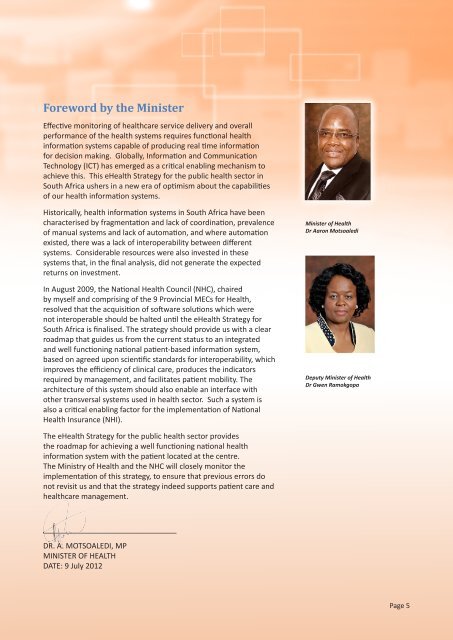
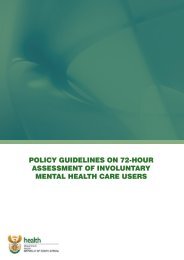
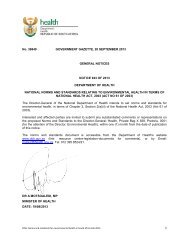

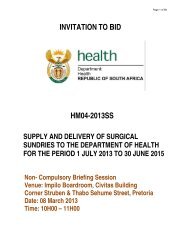
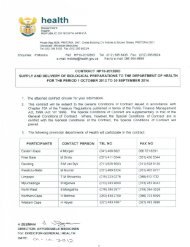
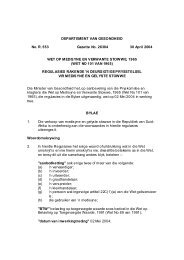
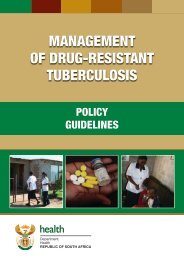
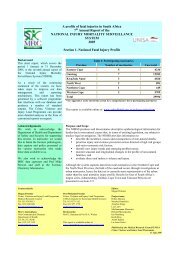
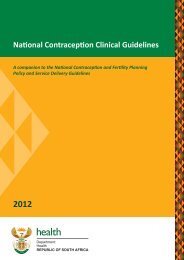
![A monograph of the management of postpartum haemorrhage [2011]](https://img.yumpu.com/15578784/1/184x260/a-monograph-of-the-management-of-postpartum-haemorrhage-2011.jpg?quality=85)
